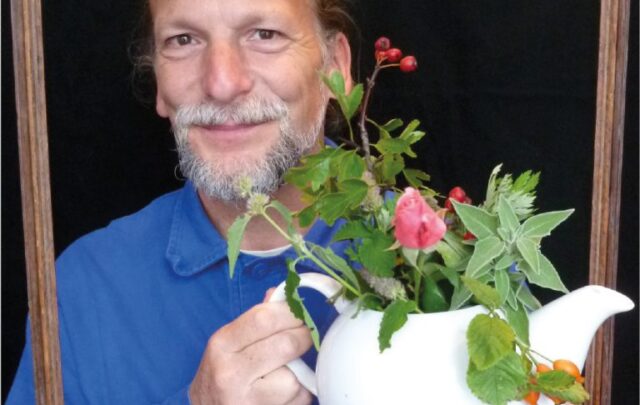In the market town of Totnes in Devon, a small group of volunteers are redistributing produce that would have otherwise gone to waste, with inspiring results (an article I wrote for the Live Better section on the Guardian’s website).
It’s a Thursday afternoon and I’m in a large and gloomy food storage shed at Riverford Organic Vegetables near Totnes in Devon with a small group of volunteers called Food in Community. We’re working in the small corner of the shed that has been allocated to us, sorting ‘grade-out’ produce not quite perfect enough for sale or nearing the end of its shelf life, into boxes for local distribution.
There are avocados, carrots, cauliflowers and apples. Broccoli and bananas, spinach and peppers. There are even some kiwi fruits. And one solitary leek.
Each box has a card stating who it’s for. There’s the Totnes Food Bank, the Drop-In Centre, Cool Recover – a local charity working with young adults with mental health issues, a local primary school, Rainbow Nursery, as well as several boxes for individuals and a few other local projects. One box goes to a community radio station offering volunteers and vulnerable adults the chance to make radio programmes. If we weren’t doing this, it would all be fed to the farm’s extremely fortunate pigs. Amid reversing forklifts and vast crates of organic produce we fill the boxes, and within an hour we’re loading volunteers’ cars for the trip back to town.

Food in Community started last year and is the brainchild of Laurel Ellis and David Markson. Initially imagined as a food gleaning project, wanting to mobilise volunteers to gather perfectly edible but uneconomic produce from local fields, their current focus sees the distribution of grade-out as "a catalyst for creating more cohesive communities and building community confidence and resilience".
One recipient of Food in Community’s boxes is local primary Grove School, which had until recently outsourced its school dinners, with only 30 out of 200 pupils taking them. When the PTA decided to take over the catering, employing a chef, take-up doubled. When Food in Community showed up and was able to bring weekly deliveries, the PTA no longer needed to buy in prepackaged and frozen produce, and could spend more on better quality local ingredients. Take-up rose to 100.

On arrival in town, we deliver boxes to people in recovery from cancer, and to others struggling to make ends meet due to the impacts of the bedroom tax. We drop four to Rainbow Nursery, housed beneath the town’s library. I ask Julie Tweed, pre-school co-ordinator, what difference the weekly deliveries make to them. "Although Totnes looks like an affluent area," she tells me, "it’s an area of rural deprivation. We feed 50 children here every day. These deliveries mean our menus have become more seasonal, more experimental. We are a charity, so free and quality produce helps us hugely. We work with families that are hungry. Some of my staff team are hungry. We can support them with free bags of fruit and vegetables, which are very deeply appreciated."
Food in Community’s thinking goes beyond just delivering produce. They have started running cookery classes at the local family centre and also in the newly-established community kitchen in the town’s Civic Hall, for people with mental health issues and older men living alone. On the drive back from Riverford I asked Laurel, where does she think this could all go?
"To really make the most of this, we need cold storage", she tells me. "I’d love to be able to do catering for local schools with a strong training and employment element, and perhaps an evening cafe."
But how replicable is this model? It may work in Totnes, with the input of small amounts of funding, its wider ‘transition town’ context and a dedicated team of volunteers, but elsewhere? "This could be done in most places", Laurel tells me, "there is surplus everywhere."
Guy Watson of Riverford Organic Vegetables loves it. "It is always painful to see good produce being wasted. It’s great to see it find a home. I especially like the way they’ve just got on with it."
Food in Community aren’t the only people looking beyond food banks, as Pam Warhurst, founder of Incredible Edible Todmorden, told me. "It doesn’t start and end with the food bank. They’re a necessity, an immediate response. But they’re the first, not the final response. It’s about providing opportunities for people to feed their families well."
If Food in Community are anything to go by, rethinking our relationship to the 15mn tonnes of food the UK discards every year could unlock much more than food, it could also be a source of health, education and community involvement.
Back at Rainbow Nursery, Julie Tweed is telling me what several other recipients of boxes have told me. "It’s like christmas when the boxes arrive, the joy of finding out what’s in the box that week." She cradles a celeriac, a root vegetable unknown to most of her young charges but which they are eyeing with fascination. "It’s like a character from Doctor Who."

Interested in finding out more about how you can live better? Take a look at this month’s Live Better Challenge here.
The Live Better Challenge is funded by Unilever; its focus is sustainable living. All content is editorially independent except for pieces labelled advertisement feature. Find out more here.






